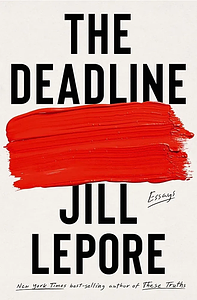You need to sign in or sign up before continuing.
Take a photo of a barcode or cover
We saw Jill Lepore at Parkway Central where she read an essay about her father's education that started with the family story that her grandfather Lepore had taken prosciutto and parmesan sandwiches to Sacco and Vanzetti in prison the essay loops out to her father's education on the GI bill and the library he left her. The whole collection does similar zeroing in to zoom out covering issues from AI to the Second Amendment. Most previously published, all worthwhile. (23 hours)
informative
reflective
medium-paced
This is a doorstop of a book, 640 pages of Jill Lepore's essays on a range of issues from parenting to politics, from literature to libraries and archives, from Covid to Constitutional interpretation. Lepore is brilliant, rigorous and deeply analytical (my God is is ever good to read proper analysis based on rigorous research!!) Most of this is spectacularly good, and the last three essays, The Trump Papers, In Every Dark Hour, and The American Beast, are the clearest smartest look at the end of the (1st) Trump presidency that I have read. I want to give this a 5-star, but I can't because Lepore drops the ball in her essays on technology.
My complaint here is not due to a difference of opinion. Though we appear pretty well politically aligned on most matters, Lepore and I differ significantly on issues of Constitutional interpretation and I do not dock her even a fraction of a point for that. Her opinions on the law are challenging, interesting and well-supported, She added dimension to the way I see several issues, including the invention or recognition (you be the judge) of a right to privacy and relatedly on the reckless use of the Commerce Clause to address all sorts of things. I think it is fair to say Lepore and I are both happy with the results of many of the early cases which identified personal rights in the Commerce Clase, and we also seem to agree that some of them are jurisprudentially unsound and led to decisions that have been very bad for all of us, but we partially disagree on where the errors lay and what the Commerce Clause should do. In any event, as noted, her opinions are well-reasoned and I respect the heck out of them even where I disagree with them. Not so with her writings on tech. She makes some weird arguments against tech qua tech and the ways it is deployed which seem to indicate that we have weakened laws to protect our privacy and that technologists just gotten less responsible and more intent on destroying the world and that in the before times people could have done the things we do now but they reined themselves in. That is crap. In These Four Walls she falsely states that the surveillance of employees through tech would have been illegal before. Not true. There were no such laws, in part because there was nothing yet to legislate. Maybe we should be protecting workers' privacy rights. that is a topic we should be talking about, but we did not do this in the past and she should not hint at an erosion of protection when there is none. Then she cites at one point that the design of systems being used now are substantially similar to things that were around 40 years ago, but now they are being deployed. There are two quite simple and logical reasons that is a specious premise upon which to argue. First, what does substantially similar even mean? The simplest tweak to an algorithm can completely change what it does and how it does it. That is like saying because humans and chimps share 98.8% of their DNA we are the same. Secondly, to the extent the systems she described had been laid out we couldn't do anything with those ideas 40 years ago. We did not have the computing power to generate and utilize needed data or the data storage solutions necessary to do anything with them. It is like saying Ada Lovelace chose not to make a computer though she knew how and Leonard DaVinci chose not to build a helicopter though the sketches of the Aerial Screw show he could have. No. They had the ideas, they were brilliant, but it was not yet possible to build these things. There were steps along the way where other people had to solve the things standing in the way of turning their visions into reality. Same with the things we have now. Technologists have not lost their way, and they were not inherently more ethical 40 years ago, they just have more to work with now. And yes, we might well be mindlessly driving ourselves to extinction, but not because we were good then and now we are not. Lepore's wholesale disdain for technology was also a problem here. Technology does great things, and it is not possible to get to those great things without seeing that same tech used for less great things. Walls shelter us and imprison us, that does not make walls bad. I hope we are able and willing to regulate things well, but that remains to be seen. (Though just today the EU passed sweeping AI regulation which is an interesting start.) This is a tangent though -- my real issue is not with Lepore's clear antipathy for technology, but with the structure of her arguments and her clear lack of research. She is too good, too wise for that. For that reason I am knocking this to a 4.5 rounded to a GR 4, truly excellent, but with a visible flaw.
My complaint here is not due to a difference of opinion. Though we appear pretty well politically aligned on most matters, Lepore and I differ significantly on issues of Constitutional interpretation and I do not dock her even a fraction of a point for that. Her opinions on the law are challenging, interesting and well-supported, She added dimension to the way I see several issues, including the invention or recognition (you be the judge) of a right to privacy and relatedly on the reckless use of the Commerce Clause to address all sorts of things. I think it is fair to say Lepore and I are both happy with the results of many of the early cases which identified personal rights in the Commerce Clase, and we also seem to agree that some of them are jurisprudentially unsound and led to decisions that have been very bad for all of us, but we partially disagree on where the errors lay and what the Commerce Clause should do. In any event, as noted, her opinions are well-reasoned and I respect the heck out of them even where I disagree with them. Not so with her writings on tech. She makes some weird arguments against tech qua tech and the ways it is deployed which seem to indicate that we have weakened laws to protect our privacy and that technologists just gotten less responsible and more intent on destroying the world and that in the before times people could have done the things we do now but they reined themselves in. That is crap. In These Four Walls she falsely states that the surveillance of employees through tech would have been illegal before. Not true. There were no such laws, in part because there was nothing yet to legislate. Maybe we should be protecting workers' privacy rights. that is a topic we should be talking about, but we did not do this in the past and she should not hint at an erosion of protection when there is none. Then she cites at one point that the design of systems being used now are substantially similar to things that were around 40 years ago, but now they are being deployed. There are two quite simple and logical reasons that is a specious premise upon which to argue. First, what does substantially similar even mean? The simplest tweak to an algorithm can completely change what it does and how it does it. That is like saying because humans and chimps share 98.8% of their DNA we are the same. Secondly, to the extent the systems she described had been laid out we couldn't do anything with those ideas 40 years ago. We did not have the computing power to generate and utilize needed data or the data storage solutions necessary to do anything with them. It is like saying Ada Lovelace chose not to make a computer though she knew how and Leonard DaVinci chose not to build a helicopter though the sketches of the Aerial Screw show he could have. No. They had the ideas, they were brilliant, but it was not yet possible to build these things. There were steps along the way where other people had to solve the things standing in the way of turning their visions into reality. Same with the things we have now. Technologists have not lost their way, and they were not inherently more ethical 40 years ago, they just have more to work with now. And yes, we might well be mindlessly driving ourselves to extinction, but not because we were good then and now we are not. Lepore's wholesale disdain for technology was also a problem here. Technology does great things, and it is not possible to get to those great things without seeing that same tech used for less great things. Walls shelter us and imprison us, that does not make walls bad. I hope we are able and willing to regulate things well, but that remains to be seen. (Though just today the EU passed sweeping AI regulation which is an interesting start.) This is a tangent though -- my real issue is not with Lepore's clear antipathy for technology, but with the structure of her arguments and her clear lack of research. She is too good, too wise for that. For that reason I am knocking this to a 4.5 rounded to a GR 4, truly excellent, but with a visible flaw.
challenging
dark
emotional
hopeful
informative
inspiring
reflective
sad
fast-paced
Jill Lepore continues to be my favorite writer. All of her books are engaging and illuminating. Minus .25 of a star for the one essay where she (in my opinion erroneously) compares the Me Too movement to anti-gay panic of the McCarthy era.
challenging
informative
reflective
slow-paced
Really solid collection of essays about recent US history and politics. I liked how well Lepore contextualizes events and roots them in earlier history. I definitely gained a better understanding of current events.
Only my 2nd DNF of the year so far.
Lepore is a good enough writer, but I did not find the subjects of most of the essays I made it through to be very interesting. Also, they were written in very academic styles, with lots of references to source material that just was not compelling.
Perhaps the worst aspect though was that I did this one on audio, and the author unfortunately chose to narrate her own work. Lepore's voice is not nice to listen to for long periods and eventually drove me to give up on the book. Might be better as a dead tree read.
Lepore is a good enough writer, but I did not find the subjects of most of the essays I made it through to be very interesting. Also, they were written in very academic styles, with lots of references to source material that just was not compelling.
Perhaps the worst aspect though was that I did this one on audio, and the author unfortunately chose to narrate her own work. Lepore's voice is not nice to listen to for long periods and eventually drove me to give up on the book. Might be better as a dead tree read.
informative
reflective
fast-paced
I’ve rewritten this review 5 times now, so I’m going to do the opposite of those reviews and keep it simple:
This book is one of the best collection of essays I’ve ever read. Further, Lepore’s reflections will have any mother balancing a life in academia throwing their hands up with in a collective “AMEN!”
I had plans to skip around the essays, to pick and choose. But the first essay gripped me in a way I wasn’t expecting. I could’ve read this in one weekend in a single setting if I’d had the time.
Buying this to have on my bookshelf and gift to future historians, friends, and mothers ✨
This book is one of the best collection of essays I’ve ever read. Further, Lepore’s reflections will have any mother balancing a life in academia throwing their hands up with in a collective “AMEN!”
I had plans to skip around the essays, to pick and choose. But the first essay gripped me in a way I wasn’t expecting. I could’ve read this in one weekend in a single setting if I’d had the time.
Buying this to have on my bookshelf and gift to future historians, friends, and mothers ✨
challenging
informative
reflective
medium-paced







